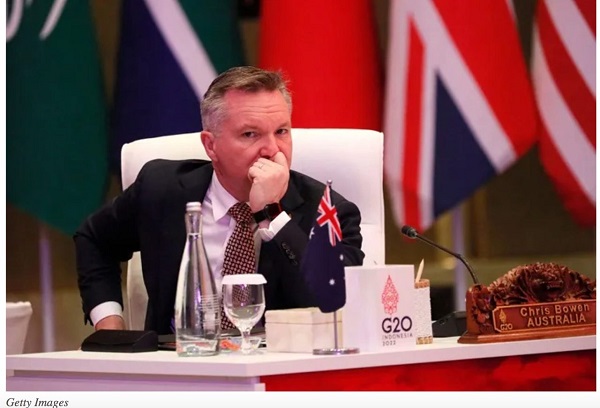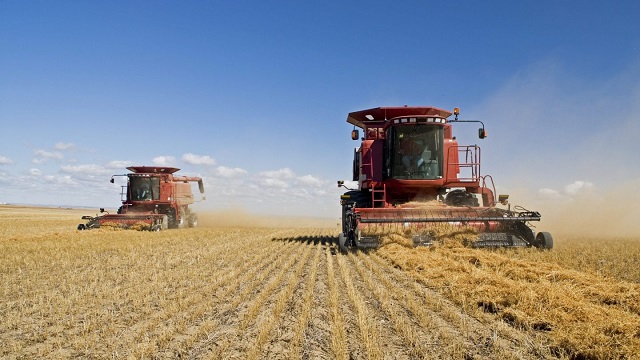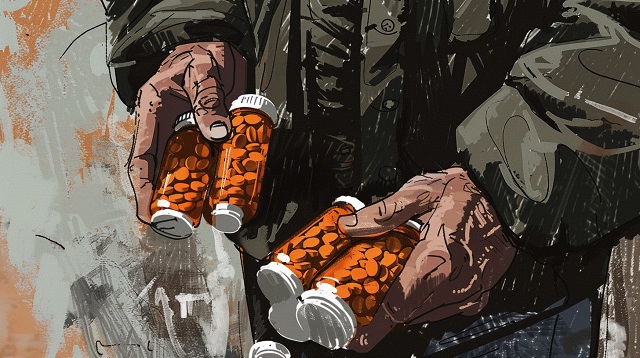Agriculture
Australia ignoring the solution to government-induced malaise

Australian PM Chris Bowen
From the Frontier Centre for Public Policy
By Alan Moran
Conscious of the imperative of self-preservation, European governments and the EU Commission itself have already taken baby steps to dilute and delay carbon emission-abating and economy-crushing agricultural and energy policies.. Not so in Australia
Studying last month’s Davos meeting of the world’s (largely self-appointed) elites, Walter Russell Mead sees an inflection point.
He says that when they listened to Argentinian President Milei promoting free market capitalism, the Davosies’ applause was more than polite clapping. There was a sense that all was not well in the supposed government-planned China, and a recognition that the more hands-on EU governmental approach has resulted in Europe slipping behind the US with its lighter government touch over the economy. This was coupled with a concern that the farmer revolts around Europe reflected a sudden rejection of trust in the establishment. Above all, Ukraine has made the Euro grandees ‘uncomfortably aware of how dependent the global system is on the leadership that only a prosperous and self-confident America can provide’.
Conscious of the imperative of self-preservation, European governments and the EU Commission itself have already taken baby steps to dilute and delay carbon emission-abating and economy-crushing agricultural and energy policies.
Not so in Australia, where governments remain totally focused on reducing the economy’s productive potential.
The Albanese government, under the Svengali and serial ministerial failure of Chris Bowen, has turbocharged carbon abatement programs crippling energy. It has:
- Vastly increased direct and regulatory-enforced expansion of the transmission lines in an attempt to allow wind and solar to work.
- Introduced a requirement for the top 215 businesses to reduce their emission levels by 30 per cent over and above reductions made necessary by the subsidies generally.
- Put in place measures to combat objections to intrusive wind farms and transmission lines.
- Refused to introduce requirements for the rectification of land and safe disposal of the materials used in wind and solar facilities.
- Vastly expanded the budgetary assistance to wind, solar, and hydrogen.
- Introduced costly requirements on firms to identify the emissions of their own activities and of those of their suppliers and customers.
The measures have been put in place by politicians, hardly any of whom have any knowledge of the energy sector, how it works, and what its costs are. Politicians have been pressed in this direction by the so-called experts, a professional elite supported by and bankrolled by subsidy-seekers, who see the global warming con as a means by which they can get paid for promoting particular forms of energy.
But the outcome is already apparent in the loss of competitiveness of our industries. The bellwether is smelting and all three of the major aluminium smelters are now in hospital care, relying on government support to offset the imposts they incur from government penalties on cheap electricity. The distress is also seen in agricultural and mining industries, which in addition to being buffeted by ever-increasing environmental costs, with their prices set globally, are seeing their margins come under pressure.
Every week brings another measure – last week we saw requirements on car retailers to ensure more fuel-efficient – higher cost cars are sold with penalties on sellers that fail to meet these requirements, penalties that will certainly increase the price Australians pay for motor vehicles.
This week, Environment Minister Tanya Plibersek boasted of spending $205 million of taxpayers’ money to buy back another 44 gigalitres of water from Murray irrigators. This is part of a process to divert 2,700 gigalitres per annum (out of 7,000 gigalitres ‘high security’ water available) from productive agriculture to uses designated as ‘environmental’. These measures massively reduce the productivity of the Murray-Darling region, responsible for 35 per cent of the nation’s farm income. They were originally justified to respond to environmental agitators’ spurious claims that irrigation was creating salt infusions, claims that were reinforced during the ‘millennial’ drought of 1997-2008 by specious assertions that climate change would drastically reduce the available water. These original rationales having been disproven, politicians’ and activists’ hostility to productive enterprise have lent the programs an ongoing inertia.
We also saw a new $100 billion a year in additional carbon tax floated by Ross Garnaut and Rod Sims; their study’s funding source was not revealed but the beneficiaries would likely be, in my opinion, subsidy-seeking economy wreckers. While ostensibly rejecting that proposal, the Prime Minister has foreshadowed extensive new decarbonisation spending programs. Nothing is being learned from the collapse of Australia’s nickel mining industry, which cannot compete with overseas mines favoured by the low-cost coal-generated electricity that Australian governments are closing down.
In addition to the current $10 billion a year in subsidies through regulations forcing the use of wind and solar, and billions of dollars spent on revoking the productive use of irrigation water, governments provide huge sums to groups that promote such waste. Unlike squandering through inefficiency that is endemic in government programs, all this spending is aimed at poisoning once highly competitive low-cost industries. Adding to measures that load the dice against employers in workplace relations, it is akin to government forcing the nation to manufacture bombs to be dropped on the people financing them.
Has anybody put the solution more succinctly than Trump-aligned Presidential hopeful, Vivek Ramaswamy? His answer was, ‘Drill. Frack. Merit over “Diversity, Equity, and Inclusion”. Stop paying people to stay at home instead of work. Fire bureaucrats. Shut down corrupt agencies. End lobbying.’
Alan Moran is a noted economist who has analysed and written extensively from a free market perspective focusing on environmental issues, housing, network industries, and energy markets. First published here.
Agriculture
Farming group accuses Canadian gov’t of trying to blame agriculture for ‘climate change’

From LifeSiteNews
Grain Farmers of Ontario chairman Jeff Harrison contends that the government’s goal of reducing emissions is not realistic and that the ‘vilification strategy’ is causing more consternation for farmers.
One of Canada’s largest farming groups has said the Liberal federal government of Prime Minister Justin Trudeau is directly going after farmers via a “vilification strategy” under the guise of “climate change” and that a recent Auditor General report proves this to be true.
Grain Farmers of Ontario chairman Jeff Harrison recently said that the Trudeau government’s request to farmers to reduce emissions is not realistic and that it only creates more issues for Canadian farmers.
“Painting this climate picture as the fault of agriculture, it vilifies farmers,” said Harrison, noting it’s a “vilification strategy” to pin the blame on farmers.
“It’s part of the added stress on farmers that they are expected to do the unachievable. They’re expected to solve a problem that they didn’t necessarily create,” he observed.
Harrison’s comments were made after a recent Auditor General report titled “Agriculture and Climate Change Mitigation” picked to pieces the Trudeau government’s voluntary 30 percent emission reduction target by 2030 through curbing fertilizer use for farmers.
The United Nations has declared a war on nitrogen, claiming its use must be slowed as it is “one of the most important pollution issues facing humans.”
However, nitrogen, which is found in fertilizers, makes up about 70 percent of Earth’s air and is essential for plants.
The Auditor General report noted that there is widespread mismanagement along with a lack of transparency from the federal programs. Notably, there was a lack of consultation with stakeholders in the farming industry, as well as farming associations, before the government put in place random fertilizer emission reduction targets.
Harrison noted that such reduction targets are “unachievable targets and unrealistic goals,” adding that such targets “p—– me off, to be honest.”
The war on farmers not unique to Canada
Farmers worldwide are facing increased pressure from governments and special interest groups linked to globalists organizations such as the World Economic Fourm to reduce fertilizer use. Indeed, as recently observed by Dr. Joseph Mercola with LifeSiteNews, the global push to get rid of farmers “from their land is being driven by NGOs, which are primarily funded by the government, making them government extensions.”
“The real agenda, however, may be traced back to the Club of Rome, a think tank that aligned with neo-malthusianism – the idea that an overly large population would decimate resources – and was intending to implement a global depopulation agenda,” Mercola wrote.
“Once the farmers are pushed out, globalists suggest eating bugs will protect the planet by eliminating the need for livestock, cutting down on agricultural land use and protecting the environment. The U.N.’s Food and Agriculture Organization also encourages the consumption of insects and insect-based foods, and the momentum to get farmers off their land is continuing to gain steam.”
Trudeau’s government is trying to force net-zero regulations on all Canadian provinces, notably on electricity generation, as early as 2035. The provinces of Alberta and Saskatchewan are adamantly opposed to Trudeau’s 2035 goals.
The Trudeau government’s current environmental goals, which are in lockstep with the United Nations’ 2030 Agenda for Sustainable Development, include phasing out coal-fired power plants, reducing fertilizer usage, and curbing natural gas use over the coming decades.
Pressure on farmers from Feds comes at same time they are dealing with higher suicide rates
When it comes to Canada’s farmers, they have already been under pressure with increased costs of fuel, not to mention all basic goods and items needed to run a farm, thanks to high inflation due in part to federal overspending.
More concerningly, increased pressures on farmers to curtail fertilizer use, and thus be faced with lower yields, come at the same time that recent studies show suicidal thoughts among farmers at extremely elevated levels.
The 2022 study from Ontario’s University of Guelph found nearly one-third of farmers have “had thoughts of suicide in the last 12 months.” The numbers are more than two times above the general population of Canada.
According to the study, about three-quarters of participating farmers experience “moderate to high-stress and half experience anxiety or depression.”
Adding to their stress, on April 1, Canada’s carbon tax, which was introduced by the government of Trudeau in 2019, increased from $65 to $85 per tonne despite seven of 10 provincial premiers objecting to the increase, and 70% of Canadians saying they are against it.
Trudeau has remained adamant that he will not pause the hikes.
He has pitched his carbon tax as the best way to reduce so-called carbon emissions. However, the tax has added extra financial burdens on households despite hundreds of dollars of rebates per family.
To reach Trudeau’s goal of net zero by 2050, the carbon tax would have to balloon to $350 per tonne.
The reduction and eventual elimination of the use of so-called “fossil fuels” and a transition to unreliable “green” energy has been pushed by the World Economic Forum (WEF) – the globalist group behind the socialist “Great Reset” agenda in which Trudeau and some of his cabinet are involved.
Agriculture
Bill C-282, now in the Senate, risks holding back other economic sectors and further burdening consumers

From the Frontier Centre for Public Policy
Bill C-282 currently sits in the Canadian Senate and stands on the precipice of becoming law in a matter of weeks. Essentially, this bill seeks to bestow immunity upon supply management from any potential future trade negotiations without offering increased market access to potential trade partners.
In simpler terms, it risks holding all other economic sectors hostage solely to safeguard the interests of a small, privileged group of farmers. This is far from an optimal scenario, and the implications of this bill spell bad news for Canadians.
Supply management, which governs poultry, egg, and dairy production in Canada, has traditionally enabled us to fulfill our domestic needs. Under this system, farmers are allocated government-sanctioned quotas to produce food for the nation. At the same time, high tariffs are imposed on imports of items such as chicken, butter, yogurt, cheese, milk, and eggs. This model has been in place for over five decades, ostensibly to shield family farms from economic volatility.
However, despite the implementation of supply management, Canada has witnessed a comparable decline in the number of farms as the United States, where a national supply management scheme does not exist. Supply management has failed to preserve much of anything beyond enriching select agricultural sectors.
For instance, dairy farmers now possess quotas valued at over $25 billion while concurrently burdening dairy processors with the highest-priced industrial milk in the Western world. Recent data indicates a significant surge in prices at the grocery store, with yogurt prices alone soaring by over 30 percent since December 2023. This escalation is increasingly straining the budgets of many consumers.
It’s evident to those knowledgeable about the situation that the emergence of Bill C-282 should come as no surprise. Proponents of supply management exert considerable influence over politicians across party lines, compelling them to support this bill to safeguard the interests of less than one percent of our economy, much to the ignorance of most Canadians. In the last federal budget, the dairy industry alone received over $300 million in research funds, funds that arguably exceed their actual needs.
While Canada’s agricultural sector accounts for approximately seven percent of our GDP, supply-managed industries represent only a small fraction of that figure. Supply-managed farms represent about five percent of all farms in Canada. Forging trade agreements with key partners such as India, China, and the United Kingdom is imperative not only for sectors like automotive, pharmaceuticals, and biotechnology but for the vast majority of farms in livestock and grains to thrive and contribute to global welfare and prosperity. It is essential to recognize that Canada has much more to offer than merely self-sufficiency in food production.
Over time, the marketing boards overseeing quotas for farmers have amassed significant power and have proven themselves politically aggressive. They vehemently oppose any challenges to the existing system, targeting politicians, academics, and groups advocating for reform or abolition. Despite occasional resistance from MPs and Senators, no major political party has dared to question the disproportionate protection afforded to one sector over others. Strengthening our supply-managed sectors necessitates embracing competition, which can only serve to enhance their resilience and competitiveness.
A recent example of the consequences of protectionism is the United Kingdom’s decision to walk away from trade negotiations with Canada due to disagreements over access to our dairy market. Not only do many Canadians appreciate the quality of British cheese, but increased competition in the dairy section would also help drive prices down, a welcome relief given current economic challenges.
In the past decade, Canada has ratified trade agreements such as CUSMA, CETA, and CPTPP, all of which entailed breaches in our supply management regime. Despite initial concerns from farmers, particularly regarding the impact on poultry, eggs, and dairy, these sectors have fared well. A dairy farm in Ontario recently sold for a staggering $21.5 million in Oxford County. Claims of losses resulting from increased market access are often unfounded, as farmer boards simply adjust quotas when producers exit the industry.
In essence, Bill C-282 represents a misguided initiative driven by farmer boards capitalizing on the ignorance of urban residents and politicians regarding rural realities. Embracing further protectionism will not only harm consumers yearning for more competition at the grocery store but also impede the growth opportunities of various agricultural sectors striving to compete globally and stifle the expansion prospects of non-agricultural sectors seeking increased market access.
Dr. Sylvain Charlebois is senior director of the agri-food analytics lab and a professor in food distribution and policy at Dalhousie University.
-

 Brownstone Institute2 hours ago
Brownstone Institute2 hours agoThe Predictable Wastes of Covid Relief
-

 Brownstone Institute5 hours ago
Brownstone Institute5 hours agoBook Burning Goes Digital
-

 conflict6 hours ago
conflict6 hours agoOver 200 Days Into War, Family Of American Hostage in Gaza Strives For Deal To Bring Son Home
-

 Addictions53 mins ago
Addictions53 mins agoCanada’s ‘safer supply’ patients are receiving staggering amounts of narcotics
-

 MAiD2 days ago
MAiD2 days agoEven Canadian leftists are starting to recognize the ‘dystopian’ nature of MAiD
-

 Censorship Industrial Complex2 days ago
Censorship Industrial Complex2 days agoElon Musk skewers Trudeau gov’t Online Harms bill as ‘insane’ for targeting speech retroactively
-

 Business2 days ago
Business2 days agoSaudis evict locals with lethal force to build ‘green’ city in line with globalist goals: report
-

 Also Interesting2 days ago
Also Interesting2 days agoThe Future of Fault Detection: AI and IoT Innovations in Garage Door Repair



